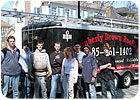Let Brown Do It
Kimberly Brown is a contractor. But not many people understand how this New York roofer has successfully managed her company for 14 years in a cutthroat, male-dominated industry.

Kimberly Brown is a contractor. But not many people understand how this New York roofer has successfully managed her company for 14 years in a cutthroat, male-dominated industry.
“The biggest challenge was to be taken seriously,” said Brown of Walworth, N.Y. “In my first five years of business you’d walk into a builder’s supply and they’d look right through you. They wouldn’t even consider you a customer because they’d see a woman standing there.”
Brown persevered, and eventually people started to take notice. “It took a long time to build a reputation,” Brown recalled. “In the beginning, I would get looked down upon by other roofers, and you wonder if this is the business for you.”
How things have changed. “Fourteen years ago I’d get the looks, but now they know I’m just this little feisty woman who works hard and gets it done,” Brown said. “I still get the looks, but most know I’m a serious roofing contractor.”

The Brown boys dropped out of school to work to support the family, and it was no different for Kimberly. “I was carrying wood and making money as a teenager, but eventually we all ended up in the construction business,” she said. “All my brothers now own their own businesses.”
Brown’s brothers are: Timothy (roofing business), James (framing houses), Alan (roofing/siding) and Michael (tractor trailer driver). “But it was my mom who taught us to be real hard workers,” Kimberly Brown said. “We had no choice. We didn’t have a lot of money growing up, so it was up to us to make something of ourselves.”
Brown recalled carrying her first bundle of shingles up on a roof when she was 16 years old. “It was a wrestling match from hell,” Brown said. “Then you tone your body and you get good at it.”
When it was time to start thinking of making a living in the roofing industry, Brown said one person always believed she could own her own company to become the contractor she is today.
“Scott Reeves believed in me from the beginning,” Brown said. “He was the head honcho of a builder’s supply company in Rochester that’s no longer there. He ran the company 20 years ago. He used to tell people: ‘I’ve seen Kim work.’ He would say, ‘This is going to change how women are viewed down the road.’”
Brown later formed an alliance with another roofing contractor, Dan Farley, who performed all high-end work, and began subcontracting Brown for certain jobs.
“That was a big point in my career,” she said. “I knew I could make a living doing this.”
Between subcontracting and owning her own roofing company over the last 14 years, Brown has remained committed to her profession. “I currently do all my own work,” she said, “and plan on doing it for a long time.”

Other male roofers in Brown’s company include Peter Brown, 39, with 14 years experience. “Peter is amazing,” Kim Brown said. “He can move debris from the ground into a dumpster like a bulldozer. I get more comments on how hard he works.”
Roofer Benjamin Lupineti, 24, has five years under his belt. “Benjamin is a roofing mechanic: one of those meticulous kind of guys who does nice detail work,” Brown said. “He moves slower because he’s neater and makes things nicer.”
Johnny Cole, 39, is the company’s “roof dog,” because he reminds Brown of a pit bull. “He’s so ambitious,” she said. “He’s a runner. He works hard like a pit bull.”
Willie Harris, 49, has four years service and does a little bit of everything. “Willie runs errands, he gets it done,” Brown said. “He’s our gopher: His personality is so sweet.”
And roofer Brett Houck is in transition and is a mechanic in training. “Brett’s loyal,” Kim Brown said. “He helps get things going in the morning. I’m fortunate to have the guys I have.”

“We tore off the roof, added insulation and baffles,” Brown said. “Built 12-inch overhangs with fascia and soffit.”
Brown said her crew installed soffit and ridge vents on the Cape Cod home, and added two new skylights and gutters.
“It looked like a completely new house without anymore huge icicles,” Brown proclaimed.
Still, Brown said her company has worked on everything from $1 million homes to one-bedroom homes. “It doesn’t matter, as long as we get the job done right and we get paid for it,” Brown said. “From multimillionaires to small-town homes, we do it all.”
Brown noted that about 5 percent of her work is in new construction, but the majority of her residential work is renovations.
“Typically, 90 percent of everything we do is city homes with wood shake shingles and two layers of asphalt,” Brown said. “We take it down to the roof. That’s the majority of what we do: complete tear-offs. There are not a lot of crews that are set up for complete tear-offs. A lot of people don’t even want to bid on them because they are so hard to do.”
She also said her company installs flashing and gutter systems with regularity. “Aluminum, steel or copper flashings,” Brown said. “Aluminum seamless gutters, too.”
Brown said safety is very important to her work crew. The company utilizes scaffolding, harnesses, planks and jacks to make sure workers are safe on the job.
“Safety is very important to me every day,” she said. “This is dangerous work.”
“I am seeking classes for slate, asbestos and lead abatement,” Brown said. “My long-term goal is to start working for a woman’s minority group called Women’s Business Enterprise. I still want to do the roofing, but I want to expand. I need to first get certificates for the abatement because basically you have to specialize in everything, even for teardowns you have to be certified.”
Brown said she is making money in the roofing contracting end of the business, but there are days when she questions her career choice.
“Every day I say I should go and sell cars and make more money, but the money is real good in roofing,” she said. “I like what I do, and I think it’s only going to get better.”
If you ever saw Kimberly Brown in person, you would probably never guess what line of work she is in. “Not in a million years would you guess what I do,” she said. “When I ring a doorbell for an estimate, you can see the expression on their face. It’s like, ‘no way.’”
Since most roofing jobs she gets are referrals, she laughs at some of the expressions she gets from customers. “They think, ‘She’s just this fiery red-head girl,’ and I know it’s an awkward kind of funny feeling,” Brown said. “But I also know I can do the job right and get it done.”
Brown admitted she is a tiny roofer, “but I kick ass.”
“I’m this little pit bull, and I don’t take crap,” she said. “It takes a lot of encouragement and confidence to run a crew of men who are used to working with men. To get their respect and loyalty, it takes a lot.”

Contractor Kimberly Brown and roofer Chris Falconer stand atop a roof during a recent project. (Photos courtesy of Allied Building Products.)
Kimberly Brown is a contractor. But not many people understand how this New York roofer has successfully managed her company for 14 years in a cutthroat, male-dominated industry.
“The biggest challenge was to be taken seriously,” said Brown of Walworth, N.Y. “In my first five years of business you’d walk into a builder’s supply and they’d look right through you. They wouldn’t even consider you a customer because they’d see a woman standing there.”
Brown persevered, and eventually people started to take notice. “It took a long time to build a reputation,” Brown recalled. “In the beginning, I would get looked down upon by other roofers, and you wonder if this is the business for you.”
How things have changed. “Fourteen years ago I’d get the looks, but now they know I’m just this little feisty woman who works hard and gets it done,” Brown said. “I still get the looks, but most know I’m a serious roofing contractor.”

The Beginning
Kimberly Brown grew up in a family with two older brothers and two younger brothers. Her mother, Judy, raised the family on her own, but for Kimberly it was a more difficult situation. “I learned from my four brothers,” she said. “I got their hand-me-downs, never my own clothes. I was one of the boys.”The Brown boys dropped out of school to work to support the family, and it was no different for Kimberly. “I was carrying wood and making money as a teenager, but eventually we all ended up in the construction business,” she said. “All my brothers now own their own businesses.”
Brown’s brothers are: Timothy (roofing business), James (framing houses), Alan (roofing/siding) and Michael (tractor trailer driver). “But it was my mom who taught us to be real hard workers,” Kimberly Brown said. “We had no choice. We didn’t have a lot of money growing up, so it was up to us to make something of ourselves.”
Brown recalled carrying her first bundle of shingles up on a roof when she was 16 years old. “It was a wrestling match from hell,” Brown said. “Then you tone your body and you get good at it.”
When it was time to start thinking of making a living in the roofing industry, Brown said one person always believed she could own her own company to become the contractor she is today.
“Scott Reeves believed in me from the beginning,” Brown said. “He was the head honcho of a builder’s supply company in Rochester that’s no longer there. He ran the company 20 years ago. He used to tell people: ‘I’ve seen Kim work.’ He would say, ‘This is going to change how women are viewed down the road.’”
Brown later formed an alliance with another roofing contractor, Dan Farley, who performed all high-end work, and began subcontracting Brown for certain jobs.
“That was a big point in my career,” she said. “I knew I could make a living doing this.”
Between subcontracting and owning her own roofing company over the last 14 years, Brown has remained committed to her profession. “I currently do all my own work,” she said, “and plan on doing it for a long time.”

Becoming a Contractor
Since the early days, Brown has come a long way. As chief executive officer of Kimberly Brown Roofing (kbrownroofing@yahoo.com), she has assembled a roofing crew that consists of all men, including her two sons, Joshua, 24, and Michael, 18. Joshua has been roofing for his mother for eight years, while Michael has two years of experience.Other male roofers in Brown’s company include Peter Brown, 39, with 14 years experience. “Peter is amazing,” Kim Brown said. “He can move debris from the ground into a dumpster like a bulldozer. I get more comments on how hard he works.”
Roofer Benjamin Lupineti, 24, has five years under his belt. “Benjamin is a roofing mechanic: one of those meticulous kind of guys who does nice detail work,” Brown said. “He moves slower because he’s neater and makes things nicer.”
Johnny Cole, 39, is the company’s “roof dog,” because he reminds Brown of a pit bull. “He’s so ambitious,” she said. “He’s a runner. He works hard like a pit bull.”
Willie Harris, 49, has four years service and does a little bit of everything. “Willie runs errands, he gets it done,” Brown said. “He’s our gopher: His personality is so sweet.”
And roofer Brett Houck is in transition and is a mechanic in training. “Brett’s loyal,” Kim Brown said. “He helps get things going in the morning. I’m fortunate to have the guys I have.”

The contracting crew at Kimberly Brown Roofing, of Walworth, N.Y., stand with the company’s owner, Kimberly Brown.
What Brown Does
Kimberly Brown’s company is involved with 100 percent residential homes, which she said allows her to be creative in remodeling and renovation. Although she is proud of many completed projects, she points to a Cape Cod home project that had no overhangs or ventilation, and vaulted ceilings.“We tore off the roof, added insulation and baffles,” Brown said. “Built 12-inch overhangs with fascia and soffit.”
Brown said her crew installed soffit and ridge vents on the Cape Cod home, and added two new skylights and gutters.
“It looked like a completely new house without anymore huge icicles,” Brown proclaimed.
Still, Brown said her company has worked on everything from $1 million homes to one-bedroom homes. “It doesn’t matter, as long as we get the job done right and we get paid for it,” Brown said. “From multimillionaires to small-town homes, we do it all.”
Brown noted that about 5 percent of her work is in new construction, but the majority of her residential work is renovations.
“Typically, 90 percent of everything we do is city homes with wood shake shingles and two layers of asphalt,” Brown said. “We take it down to the roof. That’s the majority of what we do: complete tear-offs. There are not a lot of crews that are set up for complete tear-offs. A lot of people don’t even want to bid on them because they are so hard to do.”
She also said her company installs flashing and gutter systems with regularity. “Aluminum, steel or copper flashings,” Brown said. “Aluminum seamless gutters, too.”
Brown said safety is very important to her work crew. The company utilizes scaffolding, harnesses, planks and jacks to make sure workers are safe on the job.
“Safety is very important to me every day,” she said. “This is dangerous work.”
Future Goals
With her roofing contracting business in high gear, Kimberly Brown said she is looking at purchasing a gutter business and becoming more involved with minority-based construction.“I am seeking classes for slate, asbestos and lead abatement,” Brown said. “My long-term goal is to start working for a woman’s minority group called Women’s Business Enterprise. I still want to do the roofing, but I want to expand. I need to first get certificates for the abatement because basically you have to specialize in everything, even for teardowns you have to be certified.”
Brown said she is making money in the roofing contracting end of the business, but there are days when she questions her career choice.
“Every day I say I should go and sell cars and make more money, but the money is real good in roofing,” she said. “I like what I do, and I think it’s only going to get better.”
If you ever saw Kimberly Brown in person, you would probably never guess what line of work she is in. “Not in a million years would you guess what I do,” she said. “When I ring a doorbell for an estimate, you can see the expression on their face. It’s like, ‘no way.’”
Since most roofing jobs she gets are referrals, she laughs at some of the expressions she gets from customers. “They think, ‘She’s just this fiery red-head girl,’ and I know it’s an awkward kind of funny feeling,” Brown said. “But I also know I can do the job right and get it done.”
Brown admitted she is a tiny roofer, “but I kick ass.”
“I’m this little pit bull, and I don’t take crap,” she said. “It takes a lot of encouragement and confidence to run a crew of men who are used to working with men. To get their respect and loyalty, it takes a lot.”
Looking for a reprint of this article?
From high-res PDFs to custom plaques, order your copy today!


